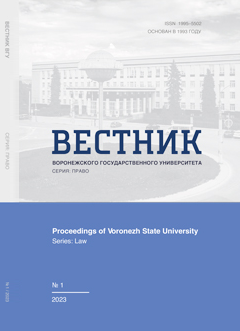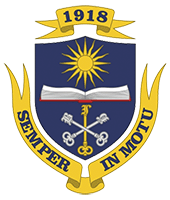Комплексный подход к определению искусственного интеллекта
Аннотация
Представлены вопросы концептуального характера: что следует вкладывать в понятие искусственного интеллекта (ИИ)? Можно ли дать исключительно юридическую трактовку данного понятия? Рассматриваются различные подходы к пониманию искусственного интеллекта, предлагается собственная его трактовка. При этом отмечается, что искусственный интеллект является одним из направлений техно науки. Делается вывод, что разработать только юридическое понятие искусственного интеллекта не представляется возможным, поскольку исследование постоянно уходит в проблему его правосубъектности, в связи с этим особое значение для развития конвергентных отношений имеет комплексный подход, позволяющий обобщить лучшие достижения различных наук в сфере искусственного интеллекта.
Скачивания
Литература
Alekseev S. S. General theory of law. In two volumes. T. II. M. : Legal Literature, 1982. 360 p.
Arzamasov Yu. G. Peculiarities of evaluating laws in conditions of convergence // Proceedings of KGU N. A. Nekrasov. 2014. № 6. P. 219–223.
Arzamasov Yu. G. Evaluation of laws in the conditions of convergence of legal systems // Legal science and legal education in the conditions of globalization and integration: state, trends and prospects. Proceedings of the VIII International scientifi c. conf. Ivanovo, October 3–6, 2014.
Ivanovo : Ivanovo State University, 2016. Р. 112–123.
Arslanov K. M. Convergence of Russian and German experience of civil law regulation: history, modernity and perspective: Dis. … doc. legal Sciences. M., 2020.
Basaev Z. V. Digitization of the Economy: Russia in the Context of Global Transformation // World of the New Economy. 2018. Vol. 12, № 4. P. 33–38.
Begishev I. R., Latypova E. Yu., Kirpichnikov D. V. Artifi cial intelligence as a legal category: a doctrinal approach to the development of a defi nition // Actual problems of economics and law. 2020. Vol. 14, № 1. P. 79–91.
Bezborodov Yu. S. Methods and forms of legal convergence in international law: Dis. … doc. legal Sciences. Yekaterinburg, 2019.
Vasiliev A. A., Pechatnova Yu. V. The place of artifi cial intelligence among the elements of the legal relationship // Digital Law. 2020. Vol. 1. № 4. Р. 74–83.
Vasiliev A. A., Shpoper D. Artifi cial intelligence: legal aspects // Izvestiya AltGU. Legal Sciences. 2018. № 6 (104). Р. 23–26.
Zhdanov A.A. Autonomous artifi cial intelligence: monograph. M. : BINOM. Knowledge Laboratory, 2009. 2nd edition. 359 p.
Zakirov R .F. The use of modern IT-technologies as a means of achieving the main tasks of legal proceedings // Proceedings of the civil process. 2018. № 1. P. 211–219.
Ioffe O. S. Legal relations according to the Soviet civil law. Leningrad : Publishing House of the Leningrad University, 1949. 144 p.
Iriskina E. N., Belyakov K. O. Legal aspects of civil liability for causing harm by the actions of a robot as a quasi-subject of civil law relations // Humanitarian Informatics. 2016. Issue. 10. P. 63–72.
Kovalchuk M., Naraykin O. Nature-Like Technologies - New Opportunities and New Threats // Safety Index. 2016. Vol. 22, № 3/4 (118/119). P. 103–108.
Kovalchuk M. V. Convergence of sciences and technologies - a breakthrough into the future // Russian Nanotechnologies. 2011. Vol. 6, № 1/2. P. 13–23.
Kovalchuk M. V. Science and life: my convergence of the ICC. M. : ICC "Akademkniga", 2011. Vol. 1. 222 p.
Laptev V. A. The concept of artifi cial intelligence and legal responsibility for its work // Law. Journal of the Higher School of Economics. 2019. № 2. P. 79–102.
Milkova E. G. Modern trends in the development of artifi cial intelligence // Technical sciences. 2021. № 6 (87). P. 26–27.
Media monitoring. Putin: there is no future without the digital economy. URL: https://digital.gov.ru/ru/events/37031/
Morhat P. M. Legal personality of artifi cial intelligence in the fi eld of intellectual property law: civil law problems: Abstract of the thesis. dis. … doc. legal Sciences. M., 2018. Nikitina E. A. Convergent technologies and transformation of the structure of knowledge // Educational resources and technologies. 2014. № (8). P. 157–166.
General Theory of Law and State: Textbook / Ed. V. V. Lazarev. M. : Lawyer. 1994. 360 p.
Ponkin I. V., Redkina A. I. Artifi cial intelligence from the point of view of law // Proceedings of the Peoples' Friendship University of Russia. Series: Legal Sciences. 2018. Vol. 22, № 1. P. 91–109.
Legal regulation of artifi cial intelligence in a pandemic and infodemic: monograph / ed. ed. V. V. Blazheeva, M. A. Egorova. M. : Prospekt, 2022. 240 p.
Legal regulation of artifi cial intelligence, robots and robotics objects as a condition for the formation of Russia's economic leadership: Monograph / G. F. Ruchkina [et al.]; ed. G. F. Ruchkina. M. : Prometheus, 2021. 350 p.
Pchelkin A. Copyright edits: who owns the rights to AI creativity // RBC. URL: https: //trends.rbc.ru/trends/industry/5e00b2ef9a794763f8a7b105
Sinelnikova V. N., Revinsky O. V. Rights to the results of artificial intelligence // Copyright. 2017. № 4. P. 17–27.
Stepin V. S. Theoretical knowledge. M. : Progress-Tradition, 2003. 568 p.
Talapina E. V. Data processing using artificial intelligence and the risks of discrimination // Law. Journal of the Higher School of Economics. 2022. Vol. 15, № 1. P. 4–27.
Theory of State and Law: Textbook for Law Schools / ed. A. S. Pigolkin. M. : Gorodets, 2003. 544 p.
Theory of state and law: textbook for law schools and faculties / ed. V. B. Isakova. M/ : Norma : INFRA-M, 2020. 656 p.
Tretyakova O. D., Kivlenok T. V. Internal convergence of law: "atypical" legal acts. Vladimir : VSPU, 2006. 216 p.
Tretyakova O. D. Legal Convergence: Dis. … doc. legal Sciences. Vladimir, 2012.
Yastrebov O. A. Artifi cial intelligence in the legal space // Proceedings of the Peoples' Friendship University of Russia. Series: Legal Sciences. 2018. Vol. 22, № 3. P. 315–328.
Artificial intelligence and life in 2030: one hundred year study on artificial intelligence / Stanford University, 2016. Available at. URL: https://www.kommersant.ru/doc/3450054
Haskins A., Arora S., Nilawar U. Impact of Artificial Intelligence on Indian Real Estate: Transformation Ahead // Colliers radar Property Research (India). 2017. P. 13.
Hodges Andrew. Alan Turing: the Enigma, 2nd ed. L., 1992.
John McCarthy. WHAT IS ARTIFICIAL INTELLIGENCE. URL: http:// www-formal.stanford.edu/jmc/whatisai/whatisai.html Kelsen H. Reine Rechtslehre. Leipzig ; Wien, 1934.
Schwab K. Fourth Industrial Revolution. M. : Eksmo, 2016. 138 p.
Turing A. Computing machinery and intelligence // Mind. 1950. № 59. P. 433–460.










